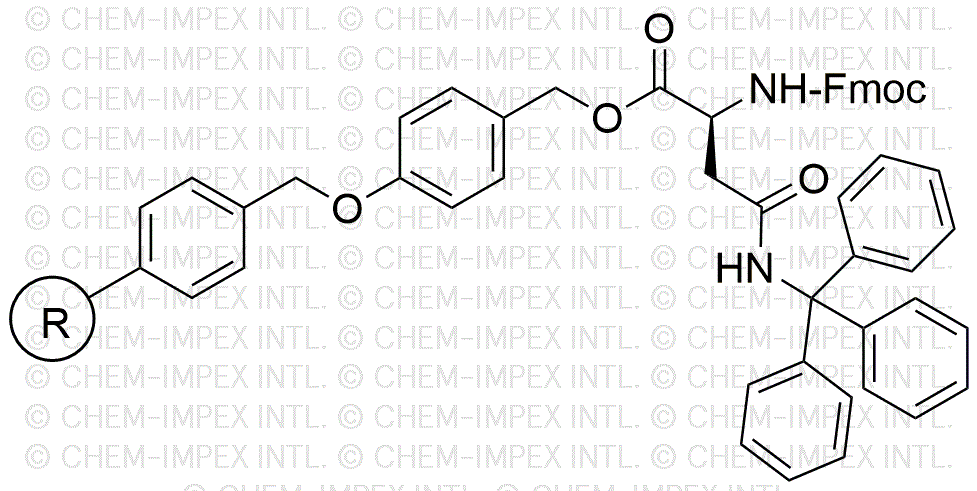Na-Fmoc-Ng-trityl-D-asparagine 4-alkoxybenzyl alcohol resin is widely utilized in research focused on:
- Peptide Synthesis: This resin is crucial in solid-phase peptide synthesis, allowing for the efficient assembly of peptides with specific sequences, which is essential in drug development and research.
- Bioconjugation: It serves as a versatile platform for attaching biomolecules, enabling the creation of targeted drug delivery systems that can improve therapeutic efficacy.
- Protein Engineering: Researchers use this resin to modify amino acids in proteins, facilitating the study of protein interactions and functions, which is vital in biotechnology and pharmaceutical research.
- Custom Resin Development: The resin can be tailored for specific applications, allowing researchers to create customized solutions for unique experimental needs, enhancing flexibility in research design.
- High Purity Products: Utilizing this resin ensures high purity of synthesized peptides, which is critical for reliable results in both academic and industrial applications.
General Information
Properties
Safety and Regulations
Applications
Na-Fmoc-Ng-trityl-D-asparagine 4-alkoxybenzyl alcohol resin is widely utilized in research focused on:
- Peptide Synthesis: This resin is crucial in solid-phase peptide synthesis, allowing for the efficient assembly of peptides with specific sequences, which is essential in drug development and research.
- Bioconjugation: It serves as a versatile platform for attaching biomolecules, enabling the creation of targeted drug delivery systems that can improve therapeutic efficacy.
- Protein Engineering: Researchers use this resin to modify amino acids in proteins, facilitating the study of protein interactions and functions, which is vital in biotechnology and pharmaceutical research.
- Custom Resin Development: The resin can be tailored for specific applications, allowing researchers to create customized solutions for unique experimental needs, enhancing flexibility in research design.
- High Purity Products: Utilizing this resin ensures high purity of synthesized peptides, which is critical for reliable results in both academic and industrial applications.
Documents
Safety Data Sheets (SDS)
The SDS provides comprehensive safety information on handling, storage, and disposal of the product.
Product Specification (PS)
The PS provides a comprehensive breakdown of the product’s properties, including chemical composition, physical state, purity, and storage requirements. It also details acceptable quality ranges and the product's intended applications.
Certificates of Analysis (COA)
Search for Certificates of Analysis (COA) by entering the products Lot Number. Lot and Batch Numbers can be found on a product’s label following the words ‘Lot’ or ‘Batch’.
*Catalog Number
*Lot Number
Certificates Of Origin (COO)
This COO confirms the country where the product was manufactured, and also details the materials and components used in it and whether it is derived from natural, synthetic, or other specific sources. This certificate may be required for customs, trade, and regulatory compliance.
*Catalog Number
*Lot Number
Safety Data Sheets (SDS)
The SDS provides comprehensive safety information on handling, storage, and disposal of the product.
DownloadProduct Specification (PS)
The PS provides a comprehensive breakdown of the product’s properties, including chemical composition, physical state, purity, and storage requirements. It also details acceptable quality ranges and the product's intended applications.
DownloadCertificates of Analysis (COA)
Search for Certificates of Analysis (COA) by entering the products Lot Number. Lot and Batch Numbers can be found on a product’s label following the words ‘Lot’ or ‘Batch’.
*Catalog Number
*Lot Number
Certificates Of Origin (COO)
This COO confirms the country where the product was manufactured, and also details the materials and components used in it and whether it is derived from natural, synthetic, or other specific sources. This certificate may be required for customs, trade, and regulatory compliance.


